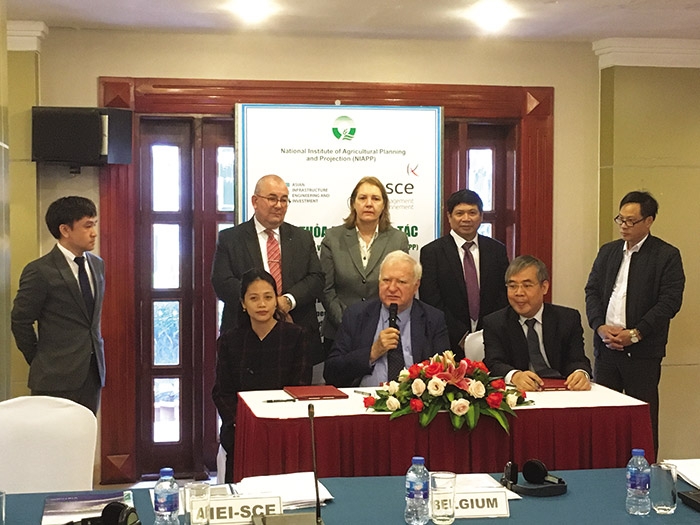Sweet water for Vietnam
 |
| The project will go some way to mitigating climate change effects |
Aware of the importance of coping with effects of climate changes in agriculture production, a specialised Belgian engineering consultancy firm, Asian Infrastructure Engineering and Investment (AIEI) is partnering up with the Vietnamese government to expand green energy investments into the country.
AIEI is a sister company of the investment company Rent-A-Port, which is well-known for the development projects of DEEP C (Dinh Vu) Industrial Zones in Vietnam. For the desalination mission, AIEI is collaborating with SCE, a company of Keran Group from France, enabling public and private parties to benefit from a global approach in development projects. The consortium has signed a memorandum of understanding (MoU) with the National Institute of Agriculture Planning and Projection (NIAPP), a research body of the Vietnamese Ministry of Agriculture and Rural Development (MARD), on a wind-driven desalination project for agricultural production and domestic use in Vietnam.
The country suffers a shortage of fresh water along the coast due to saltwater ingression. A floating off-grid, wind and solar driven micro-desalination plant can mitigate this shortage and provide fresh water to the rural communities in Vietnam, especially in the Mekong Delta. The delta has been seriously affected by saltwater intrusion into its estuaries. Figures show that total damage from salinity intrusion during the dry season and floods during the rainy season are estimated to reach 30 per cent of the total output of rice, vegetables, fruits, trees, and shrimp by 2050, equivalent to around VND3.6-12 trillion ($156.5-521.7 million). Salinisation has entered about 35-40 kilometres into the Mekong Delta, with salinity level at around 14.6-31.2 grammes per litre. The Tien River has been salinised 90km inwards from the coast, according to the MARD’s survey.
Impoverished areas in coastal and south-central provinces have also been facing salinisation which is impacting production and life.
According to the MoU, the European partners and the MARD have the intention to apply for a co-funding to the European Commission to set up the first demo plant with a total cost of approximately $5 million in Ninh Thuan province, including the following up and detailed analysis of the operations during a two years’ period. If the first demo plant is successful, the consortium and NIAPP have the intention to develop five more systems in Binh Thuan, Soc Trang, Ca Mau, Kien Giang, and Ben Tre provinces.
“Green growth and sustainable development in Vietnam are part of our group’s main concerns. We will team up with the MARD to finance plants with the ability to assemble up to 250 units in the country. This will be applied elsewhere, especially in Africa, where conditions are similar to those in Vietnam, and the demand for renewable energy for agricultural production is high,” said Marc Stordiau, chairman of AIEI.
AIEI and Rent-A-Port are also working as consultant and project manager of a venture to clean up the Halong Bay World Heritage Site in the northern province of Quang Ninh. It aims to collect and treat existing oil pollution and waste in the bay over ten years, at a cost of around $130 million.
“We are committed to a long-term business strategy in Vietnam, whereby AIEI will apply its core philosophy of sustainable development and environmental protection,” confirmed Stordiau.
What the stars mean:
★ Poor ★ ★ Promising ★★★ Good ★★★★ Very good ★★★★★ Exceptional
Related Contents
Latest News
More News
- $100 million initiative launched to protect forests and boost rural incomes (January 30, 2026 | 15:18)
- Trung Nam-Sideros River consortium wins bid for LNG venture (January 30, 2026 | 11:16)
- Vietnam moves towards market-based fuel management with E10 rollout (January 30, 2026 | 11:10)
- Envision Energy, REE Group partner on 128MW wind projects (January 30, 2026 | 10:58)
- Vingroup consults on carbon credits for electric vehicle charging network (January 28, 2026 | 11:04)
- Bac Ai Pumped Storage Hydropower Plant to enter peak construction phase (January 27, 2026 | 08:00)
- ASEAN could scale up sustainable aviation fuel by 2050 (January 24, 2026 | 10:19)
- 64,000 hectares of sea allocated for offshore wind surveys (January 22, 2026 | 20:23)
- EVN secures financing for Quang Trach II LNG power plant (January 17, 2026 | 15:55)
- PC1 teams up with DENZAI on regional wind projects (January 16, 2026 | 21:18)

 Tag:
Tag:




















 Mobile Version
Mobile Version